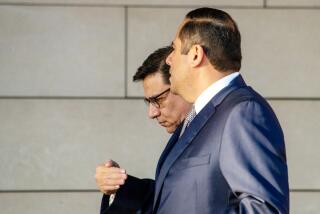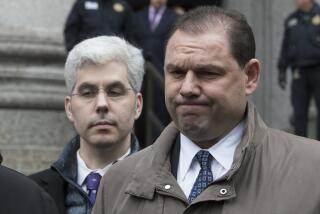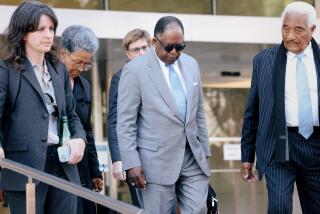Conviction of Nofziger Voided by Single Word
- Share via
WASHINGTON — A federal appeals court, bitterly divided over the use of a key adverb in an ethics law, Tuesday reversed the conviction of former White House aide Lyn Nofziger on charges that he illegally lobbied former colleagues on behalf of private clients.
The panel ruled, 2 to 1, that a special prosecutor had failed to prove that Nofziger “knowingly” violated a one-year ban on senior government officials’ lobbying their former agencies.
In a dissent, Judge Harry T. Edwards argued that no such proof was required because the adverb--buried in a long, tortuously constructed sentence in the statute--did not apply in Nofziger’s case. Edwards charged that Judges James L. Buckley and Stephen F. Williams had “labored mightily to find an ambiguity” that does not exist.
Nofziger, who was former President Ronald Reagan’s political director before becoming a lobbyist in 1982, was convicted last year on three felony counts in the first major test of the 1978 Ethics in Government Act.
A jury found him guilty of illegally lobbying former White House colleagues on behalf of a labor union and two defense contractors, including the scandal-plagued Wedtech Corp.
A “very pleased” Nofziger said at a news conference Tuesday that the ruling vindicated his previously undisclosed request that Reagan not grant him a pardon on leaving office last January.
Nofziger said that he had also been proven right in refusing to express remorse before U.S. District Judge Thomas A. Flannery, who fined him $30,000 and sentenced him to 90 days in prison.
“I believed that I was innocent, completely innocent,” said Nofziger, 64, characteristically sporting a tie depicting Mickey Mouse in an Uncle Sam suit.
Independent counsel James C. McKay, who charged that Nofziger had “cashed in” on his White House influence, said in a statement that he was studying various options for appeal. Sources said that McKay probably would ask for a rehearing by the entire 11-member U.S. Circuit Court of Appeals here.
The decision by the three-member panel turned on whether the ethics law required that prosecutors prove Nofziger had acted “knowingly” as well as “with intent to influence” when he lobbied his former colleagues at the White House.
There are two elements to the lobbying offense--making an “appearance” and making a “communication” on behalf of a client. The court majority agreed with Nofziger that “knowingly” leaped over various commas and subordinate clauses to modify key verbs in each element. Edwards argued that it applied to only one element, “appearance,” which the indictment did not cover.
“We interpret” the law “as requiring the government to demonstrate that Nofziger had knowledge of the facts that made his conduct criminal,” said Buckley, writing for the majority in a 28-page exposition of grammatical and legal fine points.
In an equally technical 12-page retort, Edwards said: “I cannot comprehend my colleagues’ convoluted attempts to embrace the appellant’s fancied ambiguity and their concomitant willingness to ignore clear legislative history and engage in overt legislating.”
One of the counts against Nofziger charged that, shortly after leaving the White House, he improperly lobbied then-presidential counselor Edwin Meese III on a $32-million Army contract for Wedtech to build small engines. It eventually was awarded to the Bronx company over the Army’s objections about the price.
The ethics law prohibits former officials such as Nofziger from lobbying ex-colleagues for one year on matters of “direct and substantial interest” to their former agencies. The prosecutors never alleged that Nofziger knew his former colleagues had a direct and substantial interest in the matters on which he was lobbying them.
Another count involved contacts that Nofziger made on behalf of the Marine Engineers Beneficial Assn., a labor union. He urged a Meese deputy, James E. Jenkins, to support increased use of civilian sailors on Navy ships. Reagan later approved the policy, and Nofziger was paid $100,000 by the union.
The third count involved representation of Fairchild Republic Corp. Nofziger lobbied two National Security Council aides on continued funding for the A-10 warplane manufactured by the company. The Pentagon soon freed $50 million to keep production alive for several months. Nofziger and a foundation he ran received $75,000 for the effort.
Nofziger said that he had spent more than $1.5 million in legal fees and lost at least that much in business since his indictment and conviction. But the former Reagan aide said that he thought he had been able to retain his good name with many people.
“I think the people who have known me in this town over the years respect me and have continued to respect me,” he said.
More to Read
Get the L.A. Times Politics newsletter
Deeply reported insights into legislation, politics and policy from Sacramento, Washington and beyond. In your inbox twice per week.
You may occasionally receive promotional content from the Los Angeles Times.










